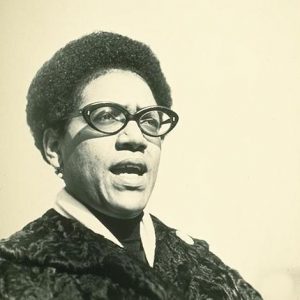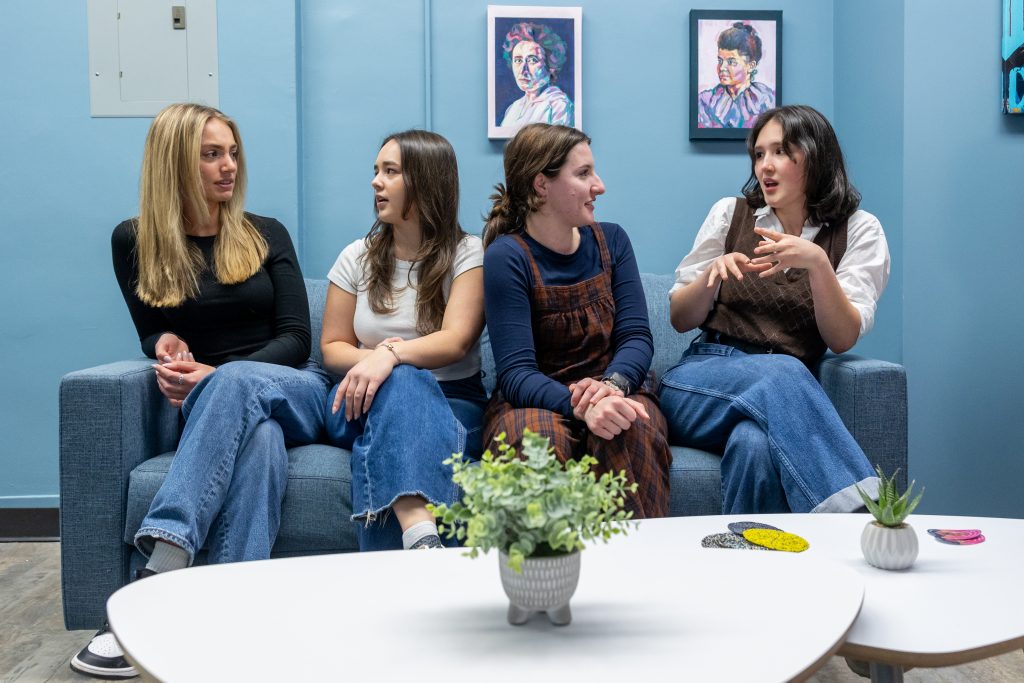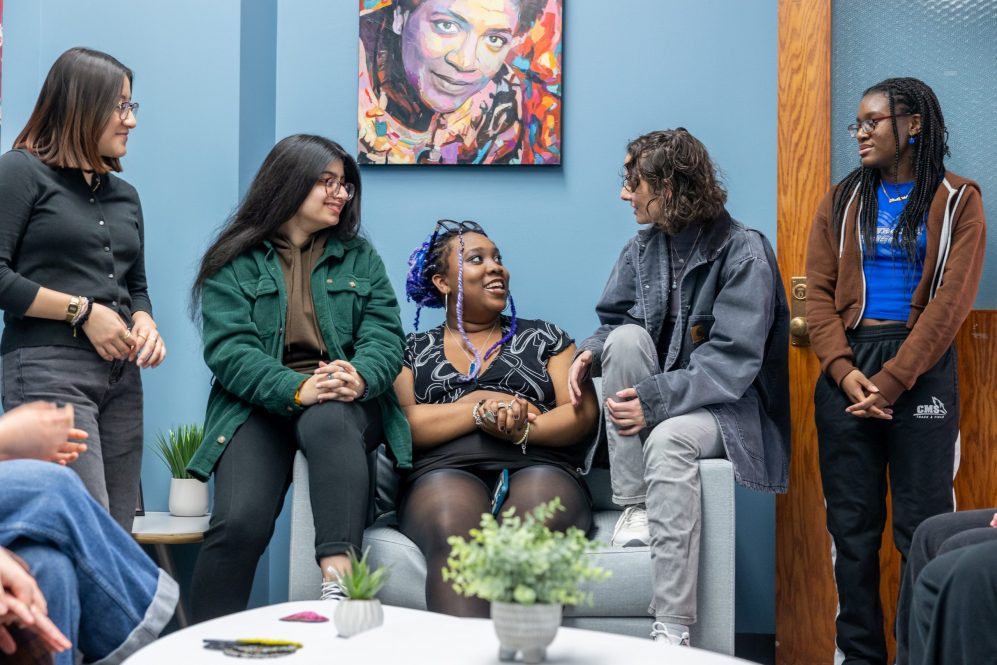For the uninitiated: WGSS, the acronym for Women, Gender, and Sexuality Studies at UConn, is affectionately pronounced “wigs” by the students. Housed in Beach Hall, where a cozy lounge offers students a place to connect and recharge, the program is beloved by hundreds of students majoring or minoring in WGSS, as well as its faculty.
Thursday, March 21, and Friday, March 22, will see a celebration marking 50 years since the program’s inception in 1974 — the first formal women’s studies program in the state.
And, true to form, this celebration will foreground complex thought, conversation, and coalition-building.
Scholars from institutions across the country will speak on panels addressing the significance of WGSS for the social and political issues facing the world today.
Alexis De Veaux, a multi-award-winning writer, activist, scholar, and biographer of Audre Lorde, will open the celebration. Later in the day, Beverly Guy-Sheftall, the Anna Julia Cooper professor of women’s studies at Spelman College, and M. Jacqui Alexander, professor emeritus of the University of Toronto’s women and gender studies department, will deliver the keynote conversation.
The event will be titled “The Uses of Anger: WGSS at 50,” in a nod to another significant event in UConn WGSS history.
“The Uses of Anger” Then and Now

In 1981, the National Women’s Studies Association (NWSA) chose UConn as the host site for its annual conference, bringing together scholars from across the then-emerging discipline of women’s and gender studies. The NWSA organized the conference around the theme of “Women Respond to Racism” and invited Audre Lorde, along with Adrienne Rich, to be the keynote speaker.
Behind the podium at Jorgensen Auditorium, Lorde delivered her famous speech “The Uses of Anger.” In it, she argued for the resignification of anger as an appropriate and human response to racism — and as a source of energy for altering the societal conditions that produce it.
“Anger expressed and translated into action in the service of our vision and our future is a liberating and strengthening act of clarification,” Lorde said.
In 2023, sitting in the lounge beneath a painting of Lorde, a WGSS organizing committee brainstormed a theme for the upcoming celebration. Associate professor in residence and WGSS interim director Sherry Zane, WGSS and English assistant professor Briona Simone Jones, and professor of political science and WGSS affiliate Jane Gordon concluded that learning from “The Uses of Anger,” looking back and looking forward, would make a generative focus.
It was an especially apt choice given Jones’s research specialization — she has worked extensively with Lorde’s oeuvre throughout her career, as a scholar of Black Lesbian thought.
“We wanted to conceive a conference around this particular essay to really scrutinize all of our efforts and be honest about whether we see Audre’s teachings as sort of litanies, or as instruction for how to achieve liberation in the here and now, or if it’s just sort of a conceptual piece of writing and we don’t feel as though we have to be committed to her practices,” Jones says.
Jones’s point is especially relevant given the context of Lorde’s original speech. The NWSA conference had been criticized for refusing to waive fees for low-income attendees, meaning attendance was essentially restricted to middle- and upper-class women. The conference was also predominantly white.
Additionally, while white women could choose from various affinity groups (Jewish women, lesbian women, etc.), Black women and women of color at the conference were all grouped together. The conference organizers encouraged them to all “sit together under a tree and talk about race together,” Zane says. Among them were Lorde, Guy-Sheftall, and bell hooks.
Lorde’s powerful speech was in part motivated by anger over the conference’s treatment of women of color. Speaking to the NWSA, she was acutely aware of how the discipline of women’s studies “has historically been violent against women of color, and Black women specifically,” as Jones notes. In the essay, Lorde emphasized the importance of building coalitions for radical change based on honesty and love for one another.

Imagining Anew
With this history in mind, the organizing committee composed of Gordon, Jones, Orozco Mendoza, and Zane, believe that the WGSS 50th anniversary should ask, “How does Women’s, Gender and Sexuality studies, as a discipline, continue to perpetuate those issues – and how can we revive and reVision our praxis?”
WGSS 50’s “Looking Back” panel will include attendees from the 1981 NWSA conference, including Judith Plaskow, professor emerita of religious studies at Manhattan College; Chela Sandoval, associate professor of Chicana Studies at the University of California, Santa Barbara; and Holly Smith, archivist at Spelman College.
In the “Looking Forward” panel, Zane says, intergenerational and transdisciplinary scholars V Varun Chaudhry, PJ Di Pietro, Evren Savci, endawnis Spears, and Jaimee Swift will consider how the discipline can continue to evolve.
“We want to bear witness to that past, so we can move toward a new vision, not just for WGSS program, but for the BIPOC students, faculty, and staff who work and live here,” Zane says. “Transformation is our future, and we’re open to all of the possibilities that brings.”
For the organizing committee, planning the 50th anniversary celebration has offered an opportunity to reflect critically about Lorde’s legacy and how future generations of UConn WGSS scholars can continue to strengthen that legacy.
In the future, Jones says, “I’m hoping that we won’t need these separate disciplines” — like WGSS, Africana Studies, and other social justice-oriented programs — “that the disciplines will actually be able to coalesce around differences. We had to create our own separate disciplines because we were excised from knowledge systems that were dominant.”
She would also like to see “the university not be heralded as the ultimate place where learning is done.”
“We can imagine something anew,” Jones says.
The two-day events are listed on the WGSS website and include several powerhouse speakers; a co-curated art exhibit by graduate and undergraduate students Nikki Blumenfeld, Ruba Bouzan, Jane Gordon, Urvi Kaul, Anh Le, Alejandra Leos, Georgia Poirot, and Christina Young, and Professors Orozco Mendoza and Zane at the Benton Museum of Art; a career roundtable with WGSS alumni; and a concert on Friday featuring American-Peruvian two-spirit, transgender poet, musician, model, and painter Bobby Sanchez.
Zane invites everyone to continue the celebration through the weekend: the Native American and Indigenous Studies (NAIS) program is hosting IndigiPalooza events, culminating on Sunday with a powwow, also listed on the WGSS @ 50 website.



